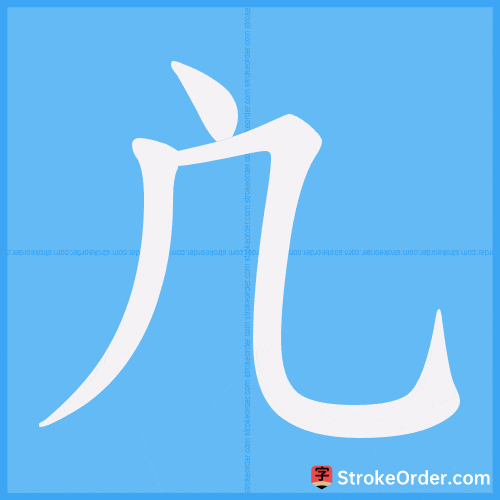凣 Stroke Order
Animated Stroke Order of 凣

Stroke Order Diagrams for 凣

Information of 凣
Pinyin
fán
Radical
几
Strokes
3 strokes
Usage
★★
Definition
凣:
1. Same as "凡" (fán).
- Meaning: Everything; all. "凡" also means "all." — “Guang Ya”
- “凡” is the general term for numbers. — “San Cang”
- A deep understanding of names; “凡” refers to the prominent matters. To refer to as “凡” is to summarize, and to clarify names and details. — “Spring and Autumn Annals”
- Regarding all offenses. — “Book of Documents”
- Zheng's note: "It is also like 'all'."
- For all women who hold titles. — “Rites of Zhou”
- For all that should be possessed. — “New Records of Yu Chu”
- For all scholars from all directions, none are exempt from bowing and shedding tears. — Ming Dynasty, Zhang Pu, "Epitaph of Five Men"
- Regarding all the landscapes of Yongjia, I have nearly traveled all through them. — Song Dynasty, Shen Kuo, "Dream Stream Notes"
- Also seen as: 凡有 (everything; all); 凡此 (all these).
2. Total.
- Counting all the payments. — “Guanzi”
- Approximately ten characters like this. — Song Dynasty, Hong Mai, "Continuing the Records of Rongzhai"
- The pavilion suffered fire four times. — Ming Dynasty, Gui Youguang, "Notes on Xiangji Pavilion"
- A total of six hundred and sixteen words. — Tang Dynasty, Bai Juyi, "Song of the Pipa (with Prelude)".